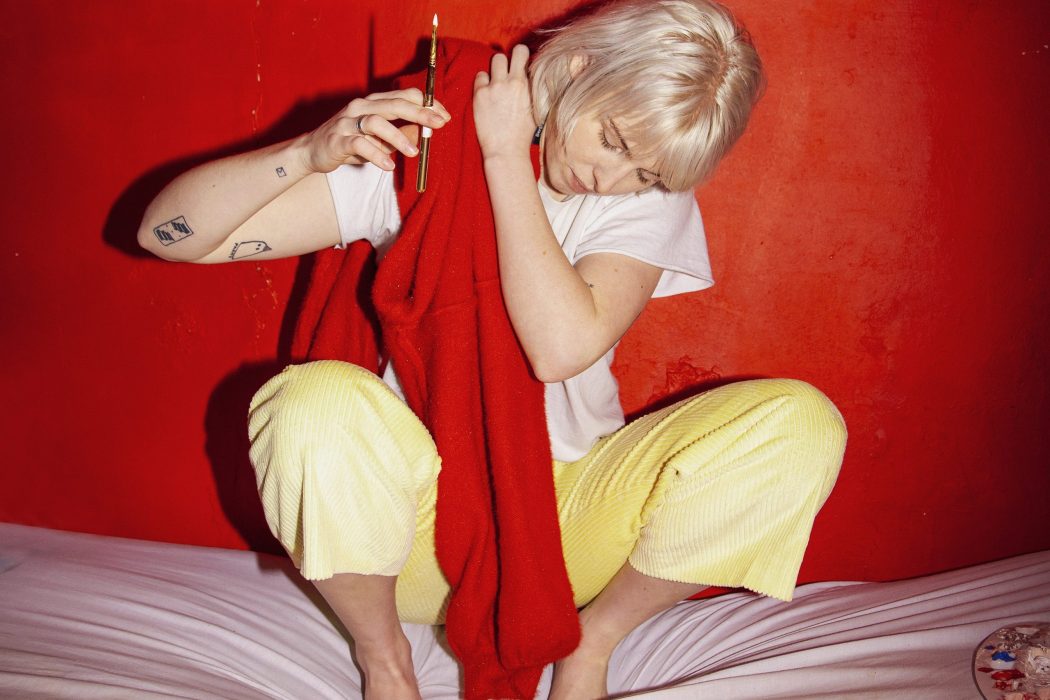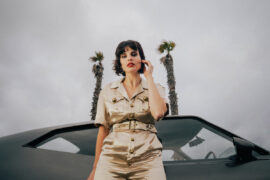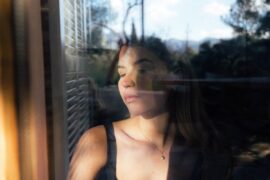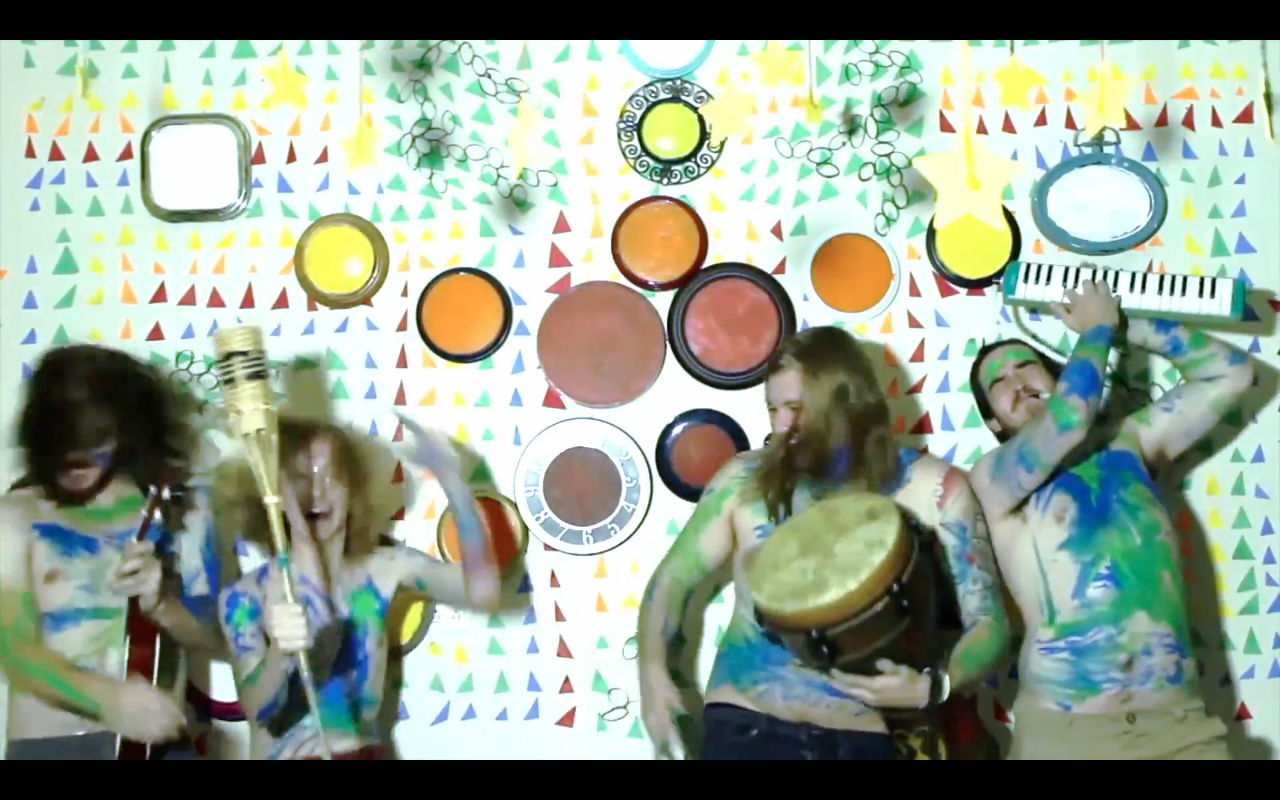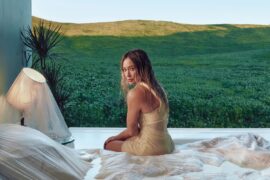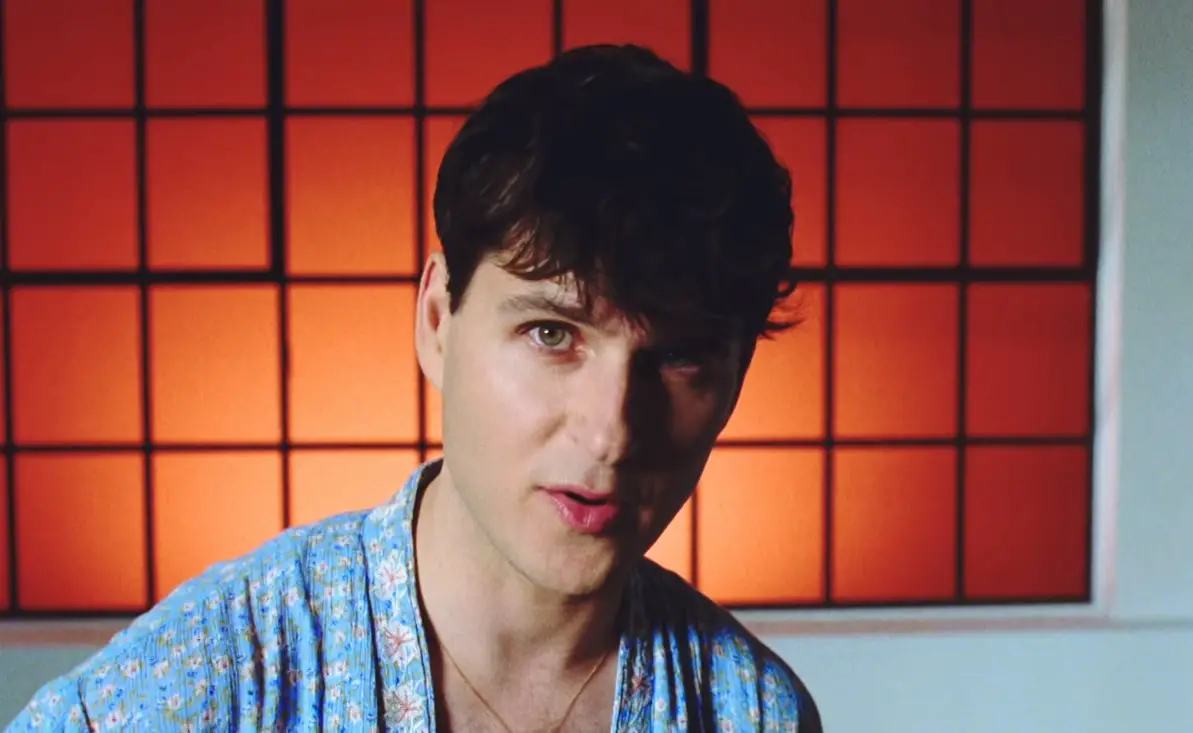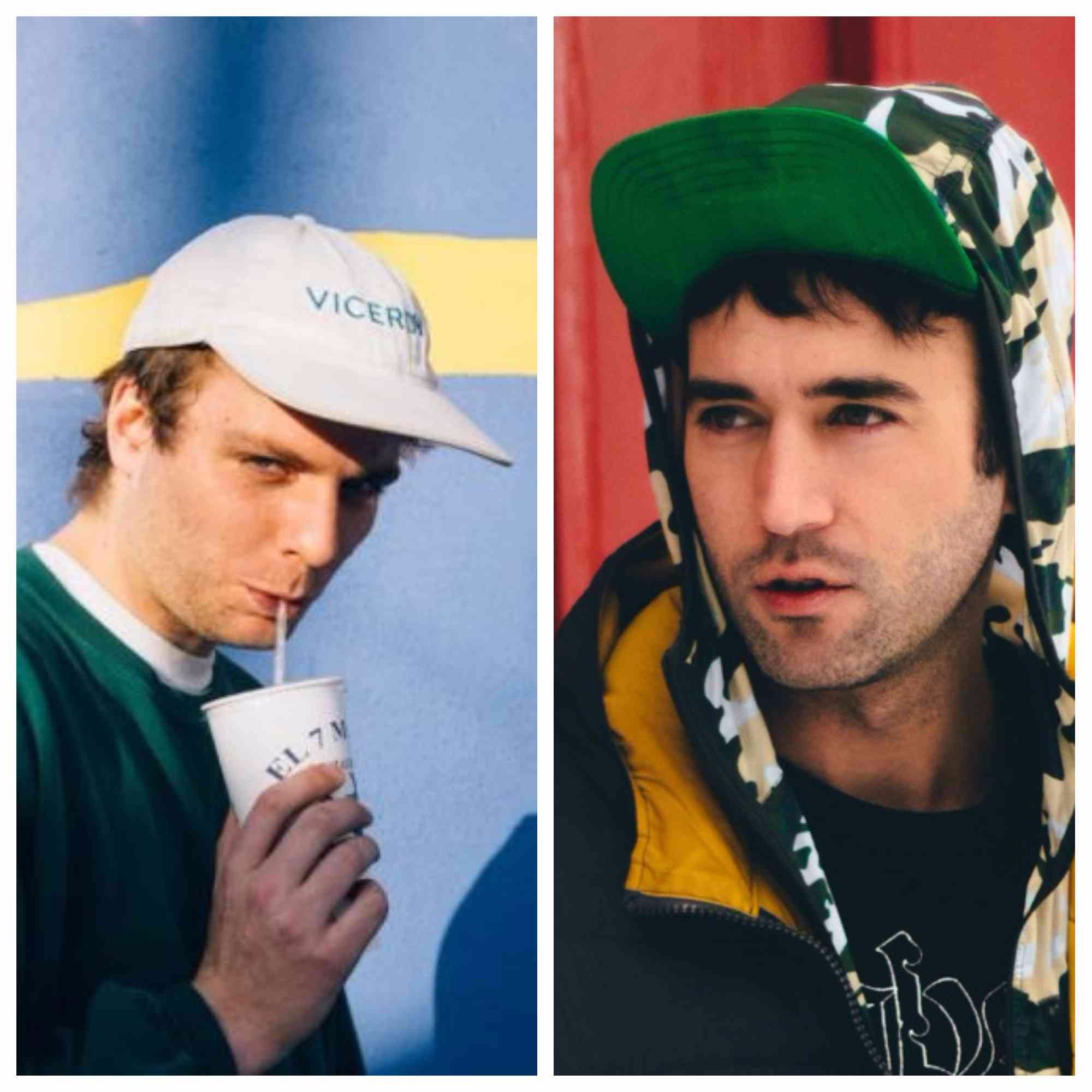Bristol-based singer/songwriter Fenne Lily chats to Atwood Magazine about her sophomore album ‘BREACH’, relationships, and the many forms of isolation.
— —
Singer/songwriter Fenne Lily’s music is the recognizably soft melancholic kind, with vocals like a trailing whisper and downbeat electric guitars. Her debut album, On Hold, is a slow, vulnerable collection of songs written as an expression of feelings in regards to love and relationships during her teenage years, songs such as “What’s Good” and “More Than You Know” clinging on to past loves or that dependence on somebody else.
Her follow-up album, BREACH (released 18 September via Dead Oceans), is bigger and more reflective, delving deep into what it means to be oneself and the differences between being lonely and being alone. A majority of the songs are wistful and tender but not referring to a time of sweetness, rather recalling the significance of complicated situations that changed Lily’s outlook towards herself.
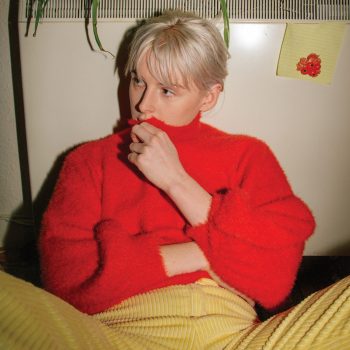
“Berlin” consists of guitar riffs and chords that seemingly wonder slowly in hazy sunshine before the instrumentation erupts like a tender heart crying out when seeking answers. Written during her time in Berlin on a solo adventure learning to be by herself, the lyrics are simple. ‘Listen to the siren call, it’s crying/ Bleeding on a foreign floor, slow dying’ go the opening lines, the life happening around her being magnified. The words ‘It’s not hard to be alone anymore’ are repeated throughout, as though her time in Berlin is defined by this concise realization. The track “I Used To Hate My Body But Now I Just Hate You” is slow-moving with a chorus that then flows like fresh tears, the comforting type that are needed to be released from the eyes in order to make your vision clearer. In “Someone Else’s Trees”, which is gentle and dreamy with plucks of acoustic guitar and a rhythm that progresses with the softness of a lullaby, remarks such as ‘I flew in over clouds that couldn’t catch me if I fell’, ‘’Cause I’m always scared of leaving and then when I arrive/ I’m distracted by existences now parallel to mine’ and ‘I’m not afraid to die, more so to be alive/ I know in this and more than I’m alone’ sum up this exploration of loneliness and being alone that is present throughout the record. It’s something that is likely relatable- that when we compare ourselves to others who are having an impact in our lives, it’s going to have a psychological effect on ourselves. As she sings in the closing lines, ‘Please don’t be long/ don’t let this go on and on/ Please don’t stay in me’, battling with the need to move on.
When I’m lonely, I smoke until I know how to sleep
So fine me, the bath is running cold but it’s deep
Finish what we started in a hotel with a view
I used to hate my body but now I just hate you
“I Used To Hate My Body But Now I Just Hate You”, Fenne Lily
As a record that deals with being alone, BREACH works well when listened to alone. Songs such as “I, Nietzsche” are energized with a sad nostalgia- even though, lyrically, it is in no way nostalgic. Similarly, “Birthday” is despondent, a dark grey palette that then becomes more lively like moving along through the aforementioned hazy sunshine.
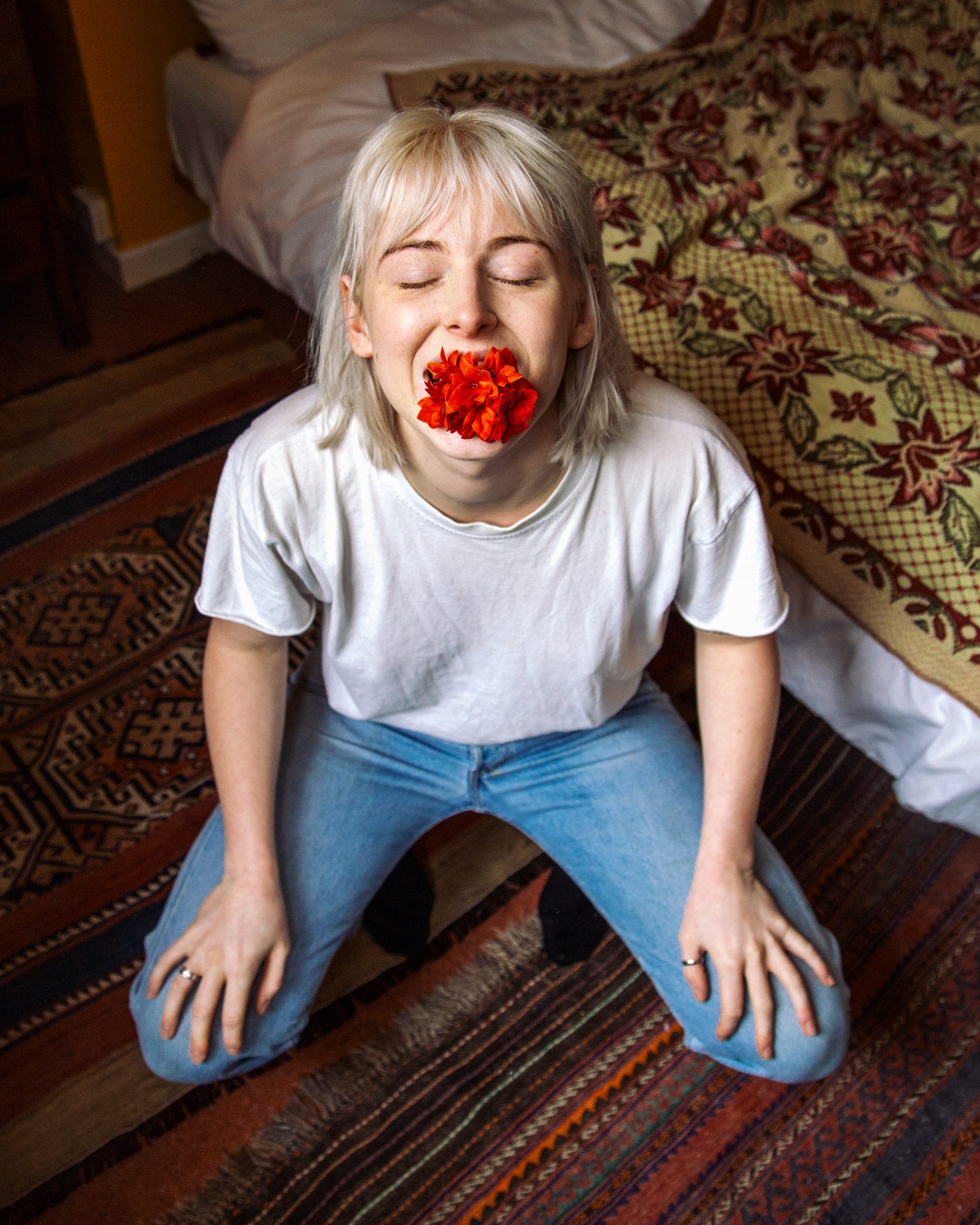
Other tracks are fuelled with a greater angst. “Alapathy” has urgent, chugging guitars that represent the mental stress that’s being highlighted with the lyrics. ‘What’s your secret for living long/ doing alright never felt so wrong/ I lose my mind under the glow of a temporary fade/ validate my fervency/ To be bound never looked so free’ the opening lines stomp but still with a softness as Lily’s vocals never lose their whispering tone. In the same vein, “Solipsism” commences with crashing drums and the frustrated ring of electric guitar, while dealing with the overwhelming feeling of anxiety.
All these people walk so slow
Do they know something I don’t?
Focus on a foreign feeling
Unashamed an unappealing
Run on empty at one and twenty
Checking up to check I’m breathing
Sign in blood to keep it beating
What is it you want to shake?
Solipsism keeps me awake
I’m empty at one and twenty
– “Solipsism”, Fenne Lily
Since the release of On Hold in 2018, Fenne Lily has toured doing headline sets as well opening for Lucy Dacus and Andy Shauf. Life on the road became a normality, something highlighted in “I, Nietzsche” (‘home is where I brush my teeth’) and “Laundry and Jet Lag” (‘Washing my clothes as soon as I’m home/ Ridding myself of the dirt from the road’). Having new material come out during a time when life on the road is inexistent and speaking with fellow musicians is long-distant, results in new methods of communication and bonding. For Fenne Lily this has involved a weekly Instagram Live feature called ‘The Bathtime Show’, chatting to friends such as Phoebe Bridgers and Willie J Healey while sat in their own baths, Lily sipping on wine and smoking a joint.
BREACH is an album of transition, both personally and musically. There are songs that were released this year that don’t appear in the collection of songs. One is “Hypochondriac”- lively, catchy, powered by inner annoyances and anxieties- and the other is “To Be A Woman, Pt.2”, angry but controlled with breathy vocals atop grungy instrumentation. “To Be A Woman, pt.1” is the opening track on BREACH and, while parts both deal with the cruelness of a guy, the former is more angered while the latter is haunting and composed – ‘To be a woman they hold over me/ I’ll be a woman/ Fucking falling apart/ Did I dare/ Did I dare/ Don’t be scared of me’ is trailed out in a ghostly manner.
Because of this, BREACH represents a period of self-assurance and of knowing what makes up one’s identity and using that to move forward.
— —
Stream: ‘BREACH’ – Fenne Lily
:: A CONVERSATION WITH FENNE LILY ::

Atwood Magazine: I feel weird interviewing you because I’ve watched some of your bathtime shows and now I feel like you should be interviewing me. Not that there would be any reason to. How did that idea come about and why the bath?
Fenne Lily: A lot of interviewers have been saying that. But it’s more because they’ve seen my tits. The show was a way to do an interesting interview with decent questions and it’s a chance to talk to people who I really admire under the guise of it being content rather than just being wanting to talk to them. So that’s nice.
Yeah I love conversations between musicians because they’re always way more insightful and natural.
Yeah, I haven’t seen a lot of it.
Yeah, there’s some podcasts that I’ve listened to in the past or sometimes there’ll be things on Youtube. But then it always makes me feel really downhearted when I’m interviewing people because I want to be on that same level, haha.
No, yeah, I didn’t want to say that I hate normal interviews but I’ll be honest some interviewers are fucking boring but I’m sure you’re not one of them. You don’t seem boring already anyway so I think we’re fine.
Yay. Cool. Has Covid had any effect on your relationships with musicians or maybe people in general? Like, because of not playing shows and stuff, are you finding your methods of communicating or the things you talk about altered?
It’s opened up an honest dialogue about the difficulties of needing to feel creative because I think that there’s that pressure that everyone who makes any kind of art feels they should probably be doing something right now. Especially through quarantine, I’ve not been feeling particular inspired and at the beginning I felt a little bit ashamed of it and was like I’m sure there’s someone somewhere writing a book or whatever. But everyone’s in the same boat. All my friends who are musicians have had tours taken away from them, we’ve all had this common ground to moan about. But it was also really sobering to hear that my other friends were struggling like I was. I’ve got a friend called Mogli in Germany and every time we talk we feel like we’ve fixed the world and talk for hours and hours and get really stoned. So it seems that that kind of dialogue and proper conversation comes out of one or both people struggling. I think the harder it’s got inspiration-wise, the easier it’s become. I dunno, you feel like you’re not by yourself. I think I’ve weirdly had more conversations with my mates during quarantine than actual face to face conversations than I did before. Which I guess is a good thing to come out of a bad situation.
Yeah, I feel like a lot of people are like that as well. I know some of my friends at the beginning were getting kind of annoyed because they were having so many video calls with family and friends that it was almost becoming like a schedule.
That’s definitely a thing. Sometimes it’s just unnecessary when a) nothing’s happening to me and b) I don’t really talk to these people. But genuinely I think it was just like let’s check that everyone is still alive. That was the vibe for a while. So I get it.
In terms of your songs, recently (before this interview opportunity appeared) I was really obsessed with the song “Hypochondriac”. I found the lyrics suddenly pretty relatable and it’s just one of those songs that’s perfect played loud with headphones in when your body’s full of angst haha. I understand that for you it’s kind of a transitional song, that it has elements of your previous stuff but then you felt it also didn’t fit on this new record. When was the moment that you realized what the new record was?
Hmmm. I went about the recording process in a strange way in that I didn’t know what was going to be on the record when I recorded all the songs. I recorded like sixteen songs in Chicago and a couple at my house by myself. When it came to mixing and mastering the record, I mixed and mastered everything and didn’t know what was going to be on the record. Then through the mixing and mastering process, we pitched down and tempo changed a few of the tracks. When I got back from Chicago, I worked with my friend Ali Chant In Bristol and he mixed it and we did vocals together. Because we slowed down and pitch shifted songs and fucked around with structure, that was the first time that I became clear what would fit together. “Hypochondriac” was actually recorded in Chicago and then re-recorded from scratch in Bristol because the way it was recorded in Chicago no longer fitted with with the rest of the songs. Then when it came to the tracklist, I realized it didn’t fit with the songs full stop. Theamtically it feels different, tonally and emotionally it feels different. It feels like the song I had to write to write the other songs; It doesn’t feel in the same family.
I leave everything to the last minute. I do everything, like choosing artwork, on the deadline- The label being like ‘what’s your final track list? You need to send this off tomorrow’ and I made a snap decision. With “Hypochondriac” I wanted that to be the first song out and then weirdly it came out on the first day of lockdown.
What’s the correlation between “To Be A Woman Pt. 1” and “To Be A Woman Pt. 2”? Again, the latter is not featured on the album so I’m guessing it’s an ‘in between’ song, even though title-wise it’s a continuation.
When I decided to work with the producer that I decided to work with, he was so far away in Chicago that I knew I only had a short amount of time to record with him. So I taught myself how to use GarageBand and I started mapping the songs out at home to speed up the recording process. When I was trying to teach myself how to use it, I made that little song which is now “To Be A Woman Pt.1” just to practice using the software. Now it’s on the record it feels really strange because it’s like the first thing that I made. But when I wrote it, I wasn’t thinking about lyrics, I was just mumbling stuff. I was in a really unhealthy very scary to leave relationship that I didn’t realize at the time was having a really bad effect on my psyche and mental health. So when I wrote the song it kind of came like a realization where I was like ‘oh my god, I’m with the wrong guy completely’ and that realization precipitated into “To Be A Woman Pt.2”. So it felt like a wake-up call: part one and part two was me seeing through that idea of having to be resilient and take back my own autonomy and leave this manipulative arsehole. So they fit together in terms of one is the parent of the other but I felt like in that vein “To Be A Woman Pt.2” feels different in attitude and blatantly angry. I didn’t want the record to be characterized by anger; I wanted it to be characterized by strength and compassion and “To Be A Woman Pt.2” is a bit like “Hypochondriac” in that I needed to write it in order to write the other stuff.
I hadn’t been by myself before for more than a day so I took myself off because I wanted to feel uncomfortable and I wanted to learn how to be better company with myself. I wrote “Berlin” after I went to Berghain by myself. And I was like ‘I’m this person. I can be this person who pushes myself outside my comfort zone etc. I can definitely go to a techno sex club rave and be fine.’ But actually I acted the way I thought I would, in the sense that I felt a bit like Louie Theroux and I was going there for research. I didn’t really feel like I was fitting in. And then I got a nose bleed and had to leave and I got back to my apartment and was like ‘despite the fact I had a crap time, it’s not hard to be by myself. I can be my own friend. And I guess the whole song, the fact that it doesn’t have many lyrics, is representative of the fact that I wasn’t doing a lot when I was there. I don’t really do a lot with my days but very small things started to feel very important. Like with sirens outside, I started to think why was somebody in an ambulance, whether they’re ok or if it’s a baby being born. So it kind of represents the monotony of being alone but also there’s a real comfort in that quietness of life. Lucy Dacus sang on it, which added a whole new sentiment to the line ‘it’s not hard to be alone anymore.’ I did a lot of touring with Lucy and I was going through three massive life changes while I was touring with her and she kind of coached me through those difficult periods and then came and sang on the song about being alone and I was like ‘I don’t feel that alone anymore’ but at the same time I know I can be if I need to be.
That's sweet. And yeah, concept-wise, BREACH is you exploring the difference between being alone and being lonely. This is something I feel like I’m also dealing with on a very regular bases so I’m interested to know what you have learnt. What is that difference for you?
I’m seeing being alone as a choice and being lonely as a symptom of a circumstance. So I can feel lonely when I’m at a party surrounded by people- I just suddenly get this feeling that I’m not in the right place- but I’ve recently realized that I don’t have that same sadness when I’m by myself. I can feel low or melancholy but I don’t feel completely lonely because there’s nobody else’s life to compare mine to. And I think, and I’m speaking as though I’m sixty, social media has had a massive impact on the way that people see being by themselves. Like you always need to be posting about shit and proving that you’re doing stuff and comparing your life to everyone else’s life and feeling like if you don’t have anything to share then you’re wasting your time. So I think I learnt, I realized that, in order to be alone you need to learn how to do that and not feel lonely. Otherwise, you’ll keep needing distractions and tiny little shit relationships. I think it’s a skill to just be in your own head. I think that’s why people meditate and stuff, to learn that just existing is enough. Choosing to be alone is just a strong choice that’s really necessary because there’s a lot of overstimulation and a lot of shit going on and you can feel invaded. Apparently Nick Cave has written an essay about the difference between being alone and being lonely and I didn’t know this until I did an interview recently.
Oh I want to read this!!
He’s stolen my fucking theme. Nah, he can have it.
I’m going to find this!
I moved to Canada last summer, partly because I just really wanted to get away because I had spent my whole life in one position and hadn’t really done stuff independently. So I had this urge to get away and start fresh. I’ve been doing that but then things keep happening where I feel myself balancing those feelings of being alone and then being lonely. And I think you’re right about loneliness being a symptom because it’s only when I really think too much about myself and compare myself or whatever that I get caught up in those emotions. Otherwise, I can go about daily life being kind of alone but it having no effect on me.
Yeah, I don’t think loneliness is always a bad thing either. Like if you miss someone that you’re seeing and they go away and you get that really privileged feeling of missing them and they come back and you get excited that they’re back. You can get that with feeling lonely, like you can know it’s not going to last forever and you’ll feel even better when you’re not lonely at some point. It’s just appreciating feelings for what they are and knowing it’s not always going to be like that.
Mmm yeah. In terms of your other songs, “I, Nietzche” is another really sweet track. What relation does it have to the philosopher?
Yeah, I mean it does but I wrote it about a guy I was seeing who read a lot of Nietzche and started referring to what he thought but he would say ‘we think this’ and ‘we think that’. And I’d be like ‘who? Who is ‘we’’? and he said ‘oh it’s me and Nietzche’. And I was like ‘fuck that.’ So it started as a pattern of writing songs for me where I allowed myself to inject some humour into it. Not everything has to be about very serious painful thing. I mean, my relationship with him was painful but I’m not really bothering to talk about that and I’ve just picked the most vile personality and made a joke of it. So it feels powerful in that way. When I first wrote it, my ex manager was like ‘I don’t think you should call this song, “I, Nietzche” because I think people are going to think you are like Nitetzche’ and I was like ‘I’m going to run that risk.’ If you listen to it, you’ll know I’m not being like, ‘I’m, Nietzche.’ There’s like that classic type of guy who will only read a book if someone is watching them read a book and I find that so boring and dumb.
But that song’s also a weird split life of being on the road and feeling needed and necessary and as though you’ve got a purpose and then going home and suddenly you’re not on stage every night or have structure. Like there’s a line ‘home is where I brush my teeth’ and that’s how I felt for a while. Home doesn’t really feel like home anymore, it’s only a place where all my things are. Home is feeling important and I don’t feel that when I’m back in my house. So I kind of touched on that. A lot of the record is roughly to do with that split feeling of being on tour and having downtime and feeling a bit crap.
And how do you feel now because obviously you haven’t been on tour in so long?
Mmm. I feel like I’ve lost a bit of my identity. It’s been really strange. I struggle to motivate myself if I don’t have a reason to do things. I mean, touring the record before it comes out is an important part of the process because you get to reintroduce yourself to those songs and immerse yourself in them so that when you do interviews or need to explain the reasoning behind something you’ve kind of lived it again. So this lack of touring has made me feel disconnected from an album that when I wrote it I felt so connected to. And I can’t really bring myself to listen to it every night in lieu of touring. I feel like I’ve lost a little bit of my body. It’s really strange. I’m just really really looking forward to touring again when this goes ahead.
Yeah!
Then there’s “Birthday”. Again, it’s a song that sonically takes you away but the lyrics are so simple. I heard that you tend to write the music before lyrics. So, with this album, was that process the same and how do you consider the relationship between the sound and the narrative of your songs, especially because the sound is a lot bigger with this record?
I write guitar and lyrics at the same time, generally. “Brithday” is the only track on the record that I didn’t pre-record on GarageBand at home- I wrote it on guitar with my voice and that was it. Then when it came to working on it in the studio, I was unclear on what to add to it because it felt like it had a tension in the verses that then had to be released in the chorus. But that was quite an extreme leap in sound. So I ended up adding a bridge to it and actually slowing down the verses loads. I try not to force any pre-existing lyrics into new songs. I tend to let the music and the lyrics come together because it feels like if it’s going to be sung together and presented together, they might as well have been born together. At a really pedestrian level, if I haven’t sung the song through and found my way through the song writing-wise with both my voice and the guitar then to play it on stage I can’t remember it. So it’s almost like I need to wonder through all the possibilities to find it out naturally what fits together in a harmonious way. But that song was so quick. I wrote it in like an hour and a half, which is the quickest I’ve ever written a song. And it feels so raw still, like the chorus is ‘you’re telling me she’s in your bed and it means nothing.’ I still really find it difficult to see pictures of those people I wrote that song about because when that situation happened I had a lot of self-hatred but also hatred for the people that had fucked me over and I didn’t want to let that feeling characterize the record. So I tried to put it all really clearly into one song and let that be the most painful part for me. Because I think it’s easier when something bad happens to let it spill into everything that you’re doing. So, yeah, that song came out fast and I’m glad because I didn’t have to relive it again and again.
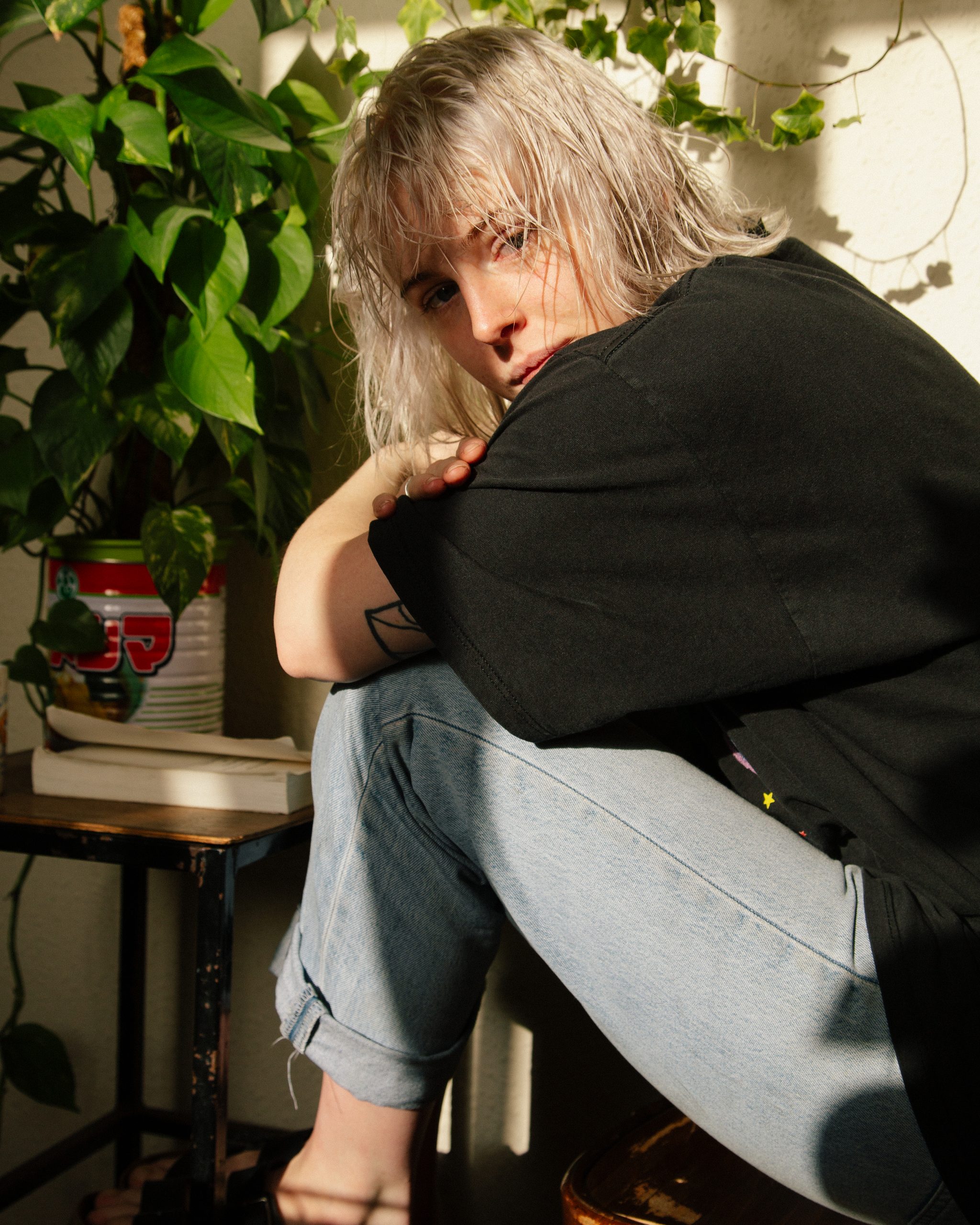
You wrote the album during a period of isolation pre-Covid times. Therefore, having since been forced into isolation, how have those emotions or whatever changed? Or, what was your mindset during the lockdown period?
Yeah, I think it helped to already know that I can survive in my own head for a month. I didn’t really think that this lockdown would be this long but it kind of gave me permission to explore different ways of doing stuff. Like when I was in Berlin and I was by myself I started drawing again and I really worked on playing guitar. I only started playing guitar because I wanted to sing and I’ve always just used it as a background accompaniment for my voice. But I really feel less accomplished as a musician than everyone I know so I took the time to get better at that. Then for Covid lockdown, I was like ‘what other skills have a let slip because I’ve been doing music for so long?’ I started painting again and reading more. I got really into writing letters and just generally falling into letting the day dictate how I felt and what I wanted to do with it other than sticking to this pattern that I had written for myself. It was kind of a time to reflect and that reflection time gets boring if you’ve got nothing to reflect on after three months. I think it must have been a shock for people who haven’t done that before. Because I absolutely decided that I needed to alone for a month and I needed to learn how to be by myself. For people that haven’t done that, it must have been really challenging because suddenly you don’t have any distractions or any company or anyone telling you what to do anymore. It’s like when you leave school for the first time and you’re like ‘what the fuck do I do with my time?’ So I feel privileged that I had the time of previous experience to myself but yeah I didn’t expect it to be so long.
Yeah. You said you were reading a lot. Do you have any recommendations?
Oh yeah. I’ve got so many books to recommend. Ok let me give you four.
When I was in Berlin, I read Patty Smith’s ‘Just Kids’ about four times. Have you read it?
I haven’t. It’s always been on my list of things I should read but I just haven’t. I will at some point soon though, for sure!
She’s brilliant. She writes about very simple daily stuff but in a poetic and poignant way.
I’ve read Jon Ronson’s ‘The Psychopath Test.’ That’s insane in a different way.
What else have I read? It’s a basic one but my mum gave me ‘Where the Crawdads Sing’ and I realized that a lot of middle aged women are reading it at book clubs and stuff. I went to hospital at the beginning of lockdown because I had this crazy headache that the nuerologists thought might be a brain tumour but it turned out not to be a brain tumour, it’s fine. I was in hospital for about twelve hours getting a lumbar puncture where they stick this big needle into your spine. And there was no wifi in the hospital and my boyfriend could’t come with me so I was there in this ward on my own with this book. I read the whole book, pretty much, in a night and cried the whole time. It’s so beautiful. It’s one of the best books I’ve ever read, which is annoying because everyone’s reading it but whatever. It’s like that for a reason.
What’s my fourth book choice? Oh, ‘The Poisonwood Bible’ by Barbara Kingsolver. It’s a big read but it goes fast. It’s about a family moving to Africa and trying to survive and the dad is a missionary and an arsehole and it’s perfect. It’s the perfect book. I highly recommend ‘The Poisonwood Bible’ for sure. But actually Lucy Dacus is a big reason why I read more now. She always seems to be reading and she has this enormous library in her house. She’s always reading on tour and when she’s touring she always brings a library with her for other people on tour to read the same books.
That’s so cool and cute!!
I also wanted to ask: I saw a live stream that you did and at the beginning you were showing illustrations from your sketch book and you just mentioned that you’ve been doing more painting. What kind of things do you like to draw? I love it when people have journals and sketchbooks full of random doodles.
Yeah. Well at the beginning of lockdown before I was so bored of my house that I couldn’t stand looking at it any more, I was just drawing like if I was sat watching a tv show or listening to a podcast I’d do it and sketch the view from where I was sitting. I actually did an art degree so I majored in dark room practices but also I also did very photorealistic oil paintings of fabric. It was a weird project. So I was really into photorealism and then realized that a photo can just do that so I might as well get more expressive with it. I’ve got a book on surrealism that I’m really enjoying working my way through. The surrealist movement is so fascinating for me. I don’t aesthetically appreciate a lot of it but thematically and politically it feels important. But most recently I’ve been painting pottery, which has been really nice. It’s kind of Porteguese style pottery painting that uses fancy paints that I bought online. So I painted my nana a lantern. I doodled on that with paints, just kind of letting myself do whatever and not thinking about the final product. That’s what I’ve really enjoyed about art after doing it as a degree. When you’re doing it as a degree and to tick boxes, once you’re out of that rat race you can just do whatever you fancy and nobody is going to judge you for it. And that’s kind of how I feel about music. I never studied music because I wanted to keep it as an instinctual kind of necessity for myself rather than doing it for someone’s approval.
Finally, because the album is very personal in terms of where the songs derive from, is there a track that’s the most powerful to you or represents the album the most?
I don’t know about a song that represents the whole album but definitely my favourite right now is “Elliott” and it’s the last song that was written for the album. I wrote it in between, we went home from recording in Chicago and we were home for two weeks and then we went back out to finish the record. And I already had too many songs for the record but I wrote this song and I was like ‘Please Brian, can we put this song on the record?’ That song is a lot about my dad’s relationship with his dad and this feeling of distrust towards authority figures I guess. I was thinking a lot about my upbringing when writing this album because my relationship with my family improved drastically when I left home. When I wrote the first album I was living at home and when I wrote this one I was in a position where I could appreciate them as people rather than feeling trapped with them. So that song reflects my appreciation for my dad becoming the best possible male influence in my life while also not having a very particular role model and figuring it out for himself. Which is a really strong, important thing to recognize in someone, their ability to unlearn what’s been taught to them and relearn by themselves how to exist compassionately.
— —

Connect to Fenne Lily on
Facebook, Twitter, Instagram
Discover new music on Atwood Magazine
? © Nicole Loucaides
:: Fenne Lily ::

